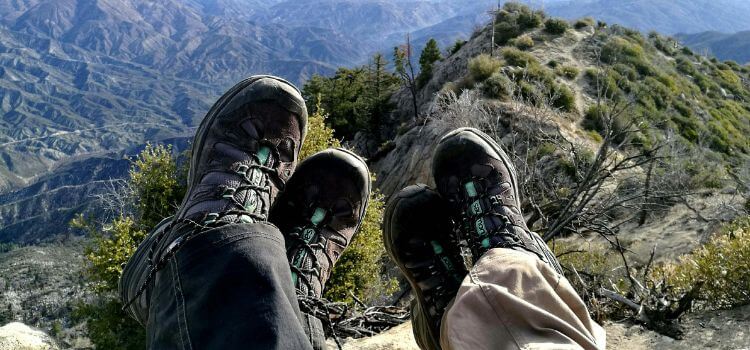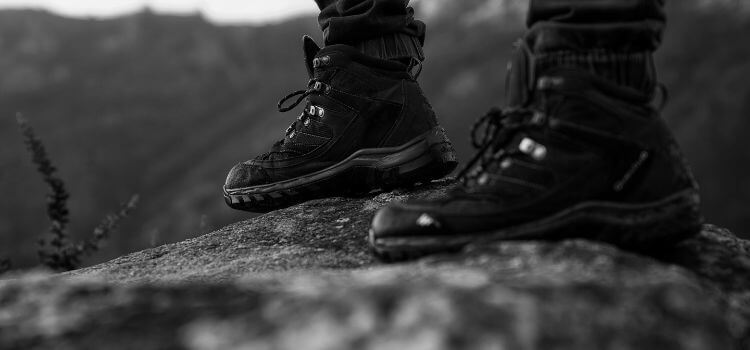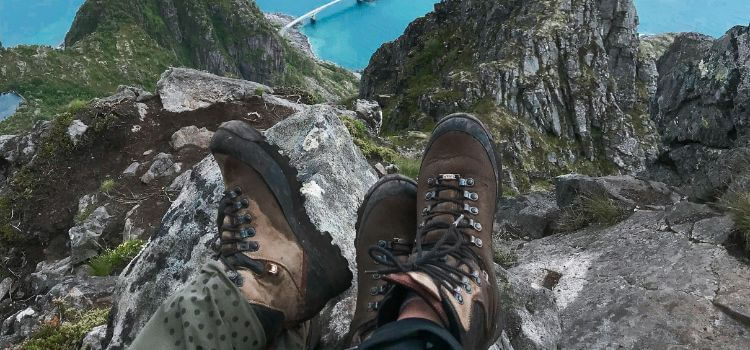Yes, you can wear hiking shoes every day. They offer durability and support for daily use.
Hiking shoes are designed for outdoor activities, but their built-in support and comfort make them a versatile choice for everyday wear. Their rugged construction provides durability, while features like water resistance and breathability lend themselves well to various everyday environments.

Whether navigating city streets or tackling your daily commute, hiking shoes can be an excellent choice for those who value sturdy footwear with outdoor functionality. Often, hiking shoes also offer a more casual, sporty style, which pairs well with a range of everyday attire. Opting for hiking shoes daily can provide long-lasting comfort and can be particularly beneficial for individuals who spend a significant amount of time on their feet.
The Appeal Of Hiking Shoes For Daily Use
The comfort and reliability of hiking shoes have brushed the trails and hit the urban streets.
People now slip into these sturdy companions beyond the call of the wild.
Durability And Ruggedness
Hiking shoes shine bright in the durability department.
Their tough build handles everyday wear and tear with ease.
These shoes are made to withstand rocky paths and muddy tracks.
- High-quality materials resist abrasions.
- Vibram soles grip onto different surfaces.
- Protective toe caps guard against stubs.
Comfort And Support
Comfort is a non-negotiable trait when choosing everyday footwear.
Hiking shoes provide ample cushioning for prolonged comfort.
| Feature | Benefit |
| Padded collars | Support ankle movement |
| EVA midsoles | Offer shock absorption |
| Breathable fabrics | Keep feet dry |
Supportive arches relieve pressure from daily activities.
Orthopedic benefits make them a favorite among active individuals.
Design Features Of Hiking Shoes
Hiking shoes are not just for trails. Their unique design features make them suitable for daily wear. Robust construction and comfort blend perfectly, offering you a shoe that meets various needs. Let’s dive into why hiking shoes could become your go-to footwear any day of the week.

Traction And Stability
The grip on hiking shoes is unbeatable. They feature soles made from high-traction rubber, which provides grip across different surfaces, from wet streets to gravel paths. The soles often have deep lugs, which add to the exceptional traction.
- Deep lugs for enhanced grip
- Multi-directional tread patterns
- Rubber compounds that resist abrasion
Hiking shoes also include a shank between the insole and outsole. This adds to the overall stability and protects your feet from uneven terrain.
Weather-resistance And Breathability
Hiking shoes showcase a unique balance between keeping feet dry and letting them breathe. Manufacturers often use materials such as Gore-Tex® for waterproofing, so your feet stay dry in the rain but don’t get overly sweaty.
| Features | Benefits |
| Waterproof materials | Keep feet dry in wet conditions |
| Breathable design | Regulates temperature and moisture |
| Quick-drying fabrics | Manage sweat and reduce odor |
Some hiking shoes also come with a mesh upper. This enhances breathability and provides comfort in warm conditions.
Pros And Cons Of Wearing Hiking Shoes Daily
Many people love their hiking shoes for outdoor adventures. But can you wear these shoes every day? Let’s weigh the pros and cons.
Longevity In Urban Settings
Hiking shoes are built to last. Their tough design can handle city life.
- Durable materials resist wear and tear.
- They offer comfort over long hours on concrete.
- Supportive soles keep feet happy during daily commutes.
Potential Overkill For City Terrain
Yet, hiking shoes may be too heavy for city streets. They are heavier than regular sneakers. Your feet might not need this armor in town.
- Their stiff soles can feel clunky on the pavement.
- Breathability can be less than urban-designed shoes.
- Costly if only used for city walking.
Comparing Hiking Shoes With Regular Footwear
Are you wondering whether those rugged, grippy hiking shoes could serve as your daily drivers? Let’s examine how hiking shoes compare to your everyday kicks.

Aesthetic Differences
Hiking shoes shout adventure with their bold design and robust construction. While you might love the outdoor vibe they exude, they’re quite a departure from the sleek look of regular sneakers or the polished feel of dress shoes. Hiking shoe colors often mimic the earthy tones found in nature, whereas everyday footwear offers a broader palette.
Functional Variances
Hiking shoes are built for rough terrain, but does this translate to everyday comfort? They often offer superior support and durability compared to regular footwear, designed for the demands of the trail. Your typical street shoes might not withstand the same punishment. Breathability can differ, too, with some hiking shoes designed for airflow and water resistance, a feature less common in casual shoes.
| Feature | Hiking Shoes | Regular Footwear |
| Support | More ankle and sole support | Varies, often less supportive |
| Durability | Built to endure rough paths | it May wear out faster on harsh surfaces |
| Design | Functional, earth-toned | More diverse styles |
| Comfort | Comfort for long distances | Comfort for everyday use |
| Breathability | Varies, with waterproof options | Primarily designed for ventilation |
Foot Health And Ergonomics
Taking care of your feet is crucial. They carry you everywhere. Good shoes keep your feet happy. Imagine wearing the wrong shoes every day. That would hurt. Hiking shoes may seem cozy for everyday use. Yet, one should consider how they affect foot health and body posture. Let’s dive into the details.
Arch Support And Cushioning
Proper arch support is a must for foot health. It helps maintain the natural shape of your feet. Hiking shoes usually have great arch support and cushioning. This makes long walks or standing feel better. But, you must pick the right fit for your foot type.
- Flat feet need structured support to prevent pain.
- Feet with high arches require extra cushioning for shock absorption.
Always remember: The wrong arch support causes discomfort. It can lead to foot and back problems.
Risk Of Over-protection
It’s possible to over-protect your feet. Yes, hiking shoes are rugged and durable. They are designed for rough terrain. Daily use may not need this level of protection. It can affect how your feet interact with flat surfaces.
Overly sturdy shoes can lead to weaker foot muscles. They can make your feet rely too much on the shoe’s support. Your feet need to work a bit, too. This keeps them strong and agile.
Here’s a quick look at why too much protection can be a problem:
| Too Much Protection | Possible Effects |
| Lack of flexibility | Can make feet lazy |
| Heavy cushioning | May weaken foot muscles |
| Stiff soles | Could reduce natural foot movement |
Overall, balance is key. Comfort and support matter. Yet, your feet need to move naturally. They also must stay strong. Choose your daily footwear wisely. Listen to your feet.
This part of your blog should now empower readers with a clear understanding of how hiking shoes can impact foot health and ergonomics.
Adapting Hiking Shoes For Everyday Fashion
Hiking shoes are no longer just for trails. Stylish, comfortable, and durable, they can be a smart addition to your daily wardrobe. With some fashion-forward thinking, you can transform these rugged essentials into everyday staples.
Pairing With Casual Wear
Hiking shoes mesh well with casual outfits. Their robust structure offers an interesting contrast to soft, relaxed clothing. Here’s how to pair them:
- Jeans: Combine hiking shoes with jeans for a classic look. Cuffed jeans highlight your boots.
- Leggings: For comfort, pair them with leggings. This combo suits active days out.
- Shorts: Shorts and hiking shoes prepare you for adventures or casual outings.
Incorporating Into Work Attire
Hiking shoes can fit into your work wardrobe, too. For professions permitting a bit of casual flair, try these tips:
- Chinos: Chinos offer a semi-formal look when teamed with polished hiking shoes.
- Skirts: Pair them with a skirt and opaque tights for an edgy yet professional look.
- Blazers: A blazer on top balances the ruggedness of the shoes.
Care And Maintenance For Daily Wear
Care and Maintenance for Daily Wear: Choosing hiking shoes for daily wear is more common than you might think. Strong and comfortable, they’re a go-to for many. But proper care is crucial to ensure they last. Here’s how to keep your hiking shoes in top shape for daily wear.

Cleaning Practices
Regular cleaning keeps shoes fresh and prolongs their life.
- Knock off loose dirt after each use.
- Remove insoles and wash them separately.
- Use a soft brush and specialized shoe cleaner for the exterior.
- Air dries away from direct heat sources.
Sole And Material Care
Soles require attention, and materials matter.
| Sole Care | Material Care |
| Check for wear and tear regularly. Avoid walking on surfaces that quickly degrade soles. | Use a waterproofing treatment for leather. Mesh materials need gentle cleaning to prevent damage. Avoid excessive folding or bending of the shoe. |
Remember, good care keeps your hiking shoes ready for everyday adventures.
Making The Switch To Everyday Hiking Shoes
Are you thinking of wearing your hiking shoes daily? Hiking shoes are not just for trails anymore. They offer comfort, durability, and support on any surface. Many now turn to their trusted hiking shoes for everyday use. Read on to explore how to make this transition smoothly.
Transitioning Gradually
Switching to hiking shoes for daily wear is smart. But it’s best to ease into it.
- Start by wearing them for short errands; this helps your feet adjust.
- Gradually increase the time you wear them each day.
- Monitor how your feet feel as you go along.
This gradual transition ensures comfort and reduces the chance of any discomfort.
Listening To Your Feet
Your feet tell you if your shoes work well for daily activities. Pay attention to:
| Signs to Watch For | Actions to Take |
| Sore spots or blisters | Consider adding insoles or trying a different pair |
| Arch or heel pain | Your shoes might need better support; look for models with enhanced arch support |
| Fatigue | Choose shoes with good cushioning and support |
Always prioritize comfort and fit. Great fit promotes foot health and overall well-being.
Testimonials And Case Studies
Exploring whether hiking shoes fit everyday wear involves real people. This section dives into personal stories and professional insights, showcasing how hiking shoes perform beyond trails.
Personal Experiences
John’s Story: John wears hiking shoes daily to his campus. Comfort and durability define his experience. With no wear after months, he highly recommends them.
Lisa’s Journey: Lisa switched to hiking shoes for her city walks. She noticed less foot pain and better posture, and she loves their versatile style.
Mark’s Adventure: Mark wears his shoes from the mountains to meetings. They are his all-weather, all-occasion footwear, and he feels prepared for any challenge.
Expert Opinions
| Expert | Opinion |
| Dr. Sarah Smith | Hiking shoes offer premium support. Great for everyday use. |
| Coach Bryan | Recommends for active lifestyles. They provide stability. |
| Fashion Stylist Emma | Advises they can be stylish. Matches many casual outfits. |
Frequently Asked Questions For Can You Wear Hiking Shoes Every Day
Is It OK to Wear Hiking Shoes Everyday?
Yes, you can wear hiking shoes every day. They offer durability and support and are suitable for various terrains and activities. Ensure they’re comfortable and fit your daily needs.
Can Hiking Shoes Be Used For Regular Walking?
Yes, hiking shoes can be used for daily walking. They offer durability and support, making them suitable for various terrains.
Can I Use Hiking Shoes For Casual Wear?
Yes, you can wear hiking shoes for casual use. Their durability and support make them versatile for everyday activities. Ensure they match your style and comfort needs for regular wear.
How Long Can You Wear Hiking Shoes?
The lifespan of hiking shoes varies, typically ranging from 300 to 500 miles, depending on usage, terrain, and shoe quality. Regular inspection ensures they remain suitable for safe hiking.
Conclusion
Hiking shoes bridge the gap between rugged trails and daily wear. Their durability and comfort make them a smart choice for everyday use. Embrace the outdoorsy vibe; your feet will thank you. Just remember to match them with your activities and style.
Hit the streets with confidence in your versatile hiking shoes.
Related posts:
- Can You Play Indoor Soccer With Turf Shoes?
- How To Make Dance Shoes Less Slippery
- How To Clean Work Shoes
- What Shoes To Wear With Work Pants In Winter
- Are Rudis Wrestling Shoes Good
- What Shoe To Wear With A Walking Boot
- How To Remove Water Stains From Leather Shoes
- What Are The Warmest Slippers For Cold Feet
- How To Clean Olukai Shoes
- Are Converse Shoes Non-Slip?: Unveiling the Truth
